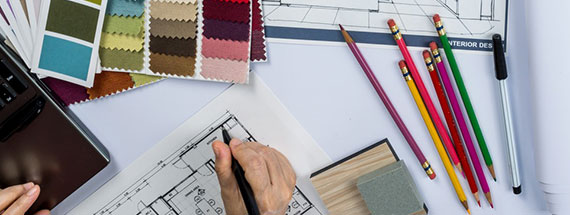Blog

In the realm of Interior Design, the decision to hire a professional can be a pivotal one. Many often face the dilemma of choosing between an interior designer and a contractor. While both play crucial roles in shaping your living spaces, there are distinct advantages to opting for an interior designer over a contractor. In this blog, we'll explore the unique value that interior designers bring to the table and why they are essential for creating spaces that are not just functional but also aesthetically pleasing.
Vision and Aesthetics:
Interior designers are trained to envision and bring to life a cohesive design concept that aligns with your style and preferences. Unlike contractors who primarily focus on a project's structural and functional aspects, interior designers emphasize the overall aesthetics, ensuring that every element complements the theme and mood of the space. Their expertise in color theory, spatial arrangement, and design principles helps create a harmonious and visually appealing environment.
Attention to Detail:
Interior designers are masters of detail. They consider every aspect of a space, from the lighting fixtures and furniture to the smallest decorative elements. This attention to detail ensures that every element contributes to the overall design vision and enhances the room's overall atmosphere. While skilled in their own right, contractors may not have the same level of detail-oriented focus as interior designers.
Space Planning and Functionality:
Beyond aesthetics, interior designers excel in optimizing space and ensuring functionality. They analyze the flow of a room, making strategic decisions about furniture placement, traffic patterns, and spatial organization. This expertise results in spaces that not only look good but are also practical and conducive to the needs of the occupants. Contractors, on the other hand, may prioritize structural considerations over the finer nuances of space planning.
Access to Resources:
Interior designers often have an extensive network of suppliers, artisans, and vendors, which gives them access to a wide range of materials and furnishings. This network allows them to source unique and high-quality items that may not be readily available to the general public. Contractors typically focus on the construction and installation aspects, relying on the homeowner for design choices and materials.
Project Management and Coordination:
Interior designers act as project managers, overseeing every aspect of the design process. They coordinate with contractors, vendors, and other professionals involved in the project to ensure seamless execution. This level of coordination is crucial for avoiding delays, resolving issues promptly, and ensuring that the final result aligns with the original design vision.
In conclusion, while contractors play a vital role in the execution of a project, interior designers bring a unique set of skills and perspectives that elevate the design to a higher level. Hiring an interior designer is an investment in the aesthetics, functionality, and overall success of your home improvement project. Their ability to blend creativity with functionality makes them indispensable partners in the journey of transforming a house into a personalized and visually stunning home.
